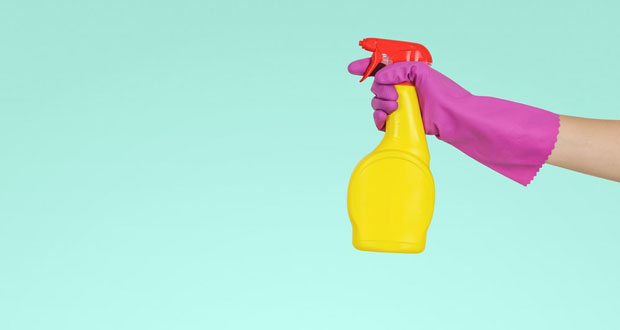With more people returning to the office on a more frequent basis, it comes as no surprise that our offices will need cleaning more regularly for the first time in a long time, and even more thoroughly now with the added paranoia of catching Covid-19.
However, it’s important to consider how toxic our most common cleaning products are, why that is, what we can do to be more eco-friendly and what we can do to limit exposure while using these products.
Direct365 conducted a secondary analysis of our offices’ cleaning products, and typical ingredients that can be considered not very eco-friendly, and what we can do to make them safer for us.
Ingredients in cleaning products in the workplace
| Ingredients | What Products They’re Usually In | Potential Effects |
| Synthetic fragrances |
|
|
| Chlorine and Bleach |
|
|
| Acetic Acid |
|
|
| Ammonia |
|
|
| Formaldehyde |
|
|
It’s impossible to eliminate all chemicals from our cleaning routine, and some do hold importance in getting rid of bacteria effectively. However, there are small things we can do the ensure our safety while cleaning and what alternatives there might be.
So, what exactly can we do about this?
Ventilate The Room While Cleaning
Never underestimate the benefits of natural ventilation, especially when cleaning. If the ingredients are unavoidable, opening windows and doors while using the products enables the toxins to escape, meaning you’re less exposed as you’ll be inhaling less of the fumes.
Don’t Overcomplicate The Products
Sometimes it’s easy to buy more products for specific purposes. This isn’t always necessary. By using fewer products that are multipurpose, lessens the number of chemicals you’ll be exposed to and is better environmentally as it means less packaging.
Look For EU Accredited Eco Labels
Look for products that are EU Eco-Accredited. Companies turn to this EU Ecolabel criteria for guidance on eco-friendly best practices when developing their product lines. Having these labels ensures that the product was made alongside recommended guidelines environmentally.
Switch To Eco Cleaning Products
Switching to eco ranges of cleaning products can reduce the pollution you produce compared to your standard cleaning product. Additionally, they typically have more natural fragrances and have a reduced amount of chemicals that could potentially be harmful to us.
Karl Bantleman at Direct365 said: “While it’s not completely impossible to eliminate all possibly harmful ingredients from our cleaning routines, it’s always important to note how we can navigate reducing their impact on us and the environment, and the possibility of some better alternatives for us. Even the smallest of swaps in products or routine can make the biggest difference in the long haul.”





